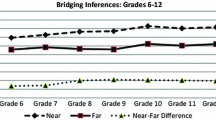Abstract
A study was designed to determine the factors that cause difficulty to adolescent listeners performing referential communication. Difficulties might arise because of (a) inability to detect message inadequacy, (b) misperception of task demands, or (c) inability to formulate an adequate question. The results of the present study showed that both able and less able subjects were able to detect message inadequacy almost perfectly, but that less able subjects had severe difficulty in formulating adequate requests for more information. Analysis suggests that in our 13-to 14-year-old subjects information-processing limitations, rather than lack of purely linguistic skills, account for most of the error variance when the task demands are transparent.
Similar content being viewed by others
References
Ackerman, B.P. (1981). Performative bias in children's interpretations of ambiguous referential communication.Child Development, 52, 1224–1230.
Asher, S.R. (1979). Referential communication. In G.J. Whitehurst & B.J. Zimmerman (Eds.),The functions of language and cognition. New York: Academic Press.
Bearison, D.J., & Levey, L.M. (1977). Children's comprehension of referential communicaltion: Decoding ambiguous messages.Child Development, 48, 716–720.
Bredart, S. (1984). Children's interpretation of referential ambiguities and pragmatic inference.Journal of Child Language, 11, 665–672.
Copple, C.E., Coon, R.C., & Lipscomb, T.J. (1977).Effects of listener feedback on the messages of kindergarten children in a referential communication task. Paper presented at the Annual Meeting of the Eastern Psychological Association, Boston.
Cosgrove, J.M., & Patterson, C.J. (1977). Plans and the development of listener skills.Developmental Psychology, 13, 557–564.
Dickson, W.P. (Ed.) (1981)Children's oral communication skills. New York: Academic Press.
Flavell, J.H., Botkin, P.T., Fry, C.L., Wright, J.C., & Jarvis, P.E. (1968).The development of role-taking and communication skills in children. New York: Wiley.
Glucksberg, S., Krauss, R.M., & Higgins, E.T. (1975). The development of referential communication skills. In F.D. Horowitz (Ed.),Review of child development research (Vol. 4), Chicago: University of Chicago Press.
Glucksberg, S., Krauss, R.M., & Weisberg, R. (1966). Referential communication in nursery school children: Method and some preliminary findings.Journal of Experimental Child Psychology, 3, 333–342.
Ironsmith, M., & Whitehurst, G.J. (1978). How children learn to listen: The effects of modelling feedback styles on children's performance in referential communication.Developmental Psychology, 14, 546–554.
Jackson, S., & Jacobs, S. (1982). Ambiguity and implicature in children's discourse comprehension.Journal of Child Language, 9, 209–216.
Krauss, R.M., & Gorin, L. (1981). Children's ability to adjust their standards for evaluating comprehension.Journal of Educational Psychology, 73, 320–325.
Patterson, C.L., Cosgrove, J.M., & O'Brien, R.G. (1980). Nonverbal indicants of comprehension and noncomprehension in children.Developmental Psychology, 16, 38–48.
Patterson, C.J., & Kister, M.C. (1981). The development of listener skills for referential communication. In W.P. Dickson (Ed.),Children's oral communication skills, New York: Academic Press.
Patterson, C.J., Massad, C.M., & Cosgrove, J.M. (1978). Children's referential communication: Components of plans for effective listening.Developmental Psychology, 14, 401–406.
Patterson, C.J., & Roberts, R.J. (1982). Planning and the development of communication skills.New Directions for Child Development, 18, 29–46.
Peterson, C.L., Danner, F.W., & Flavell, J.H. (1972). Developmental changes in children's responses to three indications of communicative failure.Child Development, 43, 1463–1468.
Shatz, M. (1978). The relationship between cognitive processes and the development of communication skills. In B. Keasey (Ed.),Nebraska symposium on motivation. Lincoln: University of Nebraska Press.
Sonnenschein, S. (1984). How feedback from a listener affects children's referential communication skills.Developmental Psychology,20, 287–292.
Author information
Authors and Affiliations
Additional information
This research was supported by a grant from the Leverhulme Foundation (U.K.) to the third author, and a grant from the Economic and Social Research Council (U.K.) to the first author (reference CO8250011). We are grateful to R. Lee Humphreys for advice and assistance.
Rights and permissions
About this article
Cite this article
Brown, G.D.A., Sharkey, A.J.C. & Brown, G. Factors affecting the success of referential communication. J Psycholinguist Res 16, 535–549 (1987). https://doi.org/10.1007/BF01067083
Accepted:
Issue Date:
DOI: https://doi.org/10.1007/BF01067083




